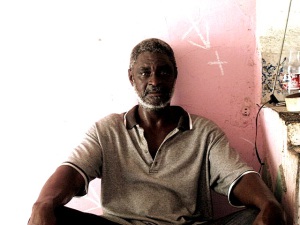Despite the fact that revolutionary slogans keep repeating that the fight against discrimination based on skin colour has been won, the reality is different: black people are still subject to discrimination in Cuba.
A neighbour’s daughter got once captivated by the performance of the ballet of Giselle she saw on TV. Full of enthusiasm, she went with her mother to a recruitment session held by the Alejo Carpentier elementary school of ballet in June. They examined her skills, doubting her talent for dancing, but she proved to be the best in the group of applicants.
When she came back to hear the verdict, confident that she might one day perform on one of the big stages she had so far seen only on TV, she was turned down. Before giving her goodbye and a practised smile, they advised her to join a company doing folk dances. It was simply unthinkable to have a dark-skinned Giselle.

I had a chance to verify what she was saying when I once had to use a public pay phone last month and I noticed an announcement – one of those that are commonly plastered all over such places. As I was picking up the receiver, I suddenly stopped and remained speechless when I saw an announcement asking young people to join a group of ballet dancers – yet, there was a detail highlighted in bold black letters (what an apt choice of colour!): No dark-skinned males or females shall be admitted.
The announcement stayed there for several days, placed between two telephone apparatuses on one of the walls of the ground floor of the well-known Ten Cent in the Calle Monte street. A few days later, someone dared to scratch it, attaching a message to the author reading “RACISTS!”. After some time, the atrocious advertisement was removed completely.
Silverio Portal Contreras, a friend of mine whom we affectionately call “negrón” (nigger) on account of his being so tall and so dark-skinned, has recently told me about his experience when he appeared at the employment bureau of the Ministry of Tourism, properly lodging an application for a job in the five-star Hotel Parque Central run by Iberostar. He received the following answer: “We will inform you via a telegram, comrade”. A year has passed and our friend is still waiting for the official reply, looking out of his balcony every time he hears the whistle of the postman.
In Cuba, having a very dark skin is a serious obstacle for all those who aspire to a job seen by the society as prestigious. Vacancies for blacks that are offered in the job market range from waste collector, construction worker through stevedore and gravedigger to domestic staff.
My own experience along with the repeated testimonies I hear go hand in hand with the direct operational focus of senior Police Officers on dark-skinned citizens, who are always viewed as potential criminals. The adjectives used by the Police when arresting black people reveal the stigma of their skin – they are called the dark-browns, dark-skinned, shoe polish, blackbirds, asphalt, niggers and if the colour of their skin is really deep black, they are called the blue-blacks.
It’s a shame to live like this – I have always believed that we would be able to overcome the Hispanic heritage of the slavery times, but the truth is that racism is still far from being eradicated. Perhaps it’s because there’s a mechanism ensuring its continuity among the people.

Leave a comment